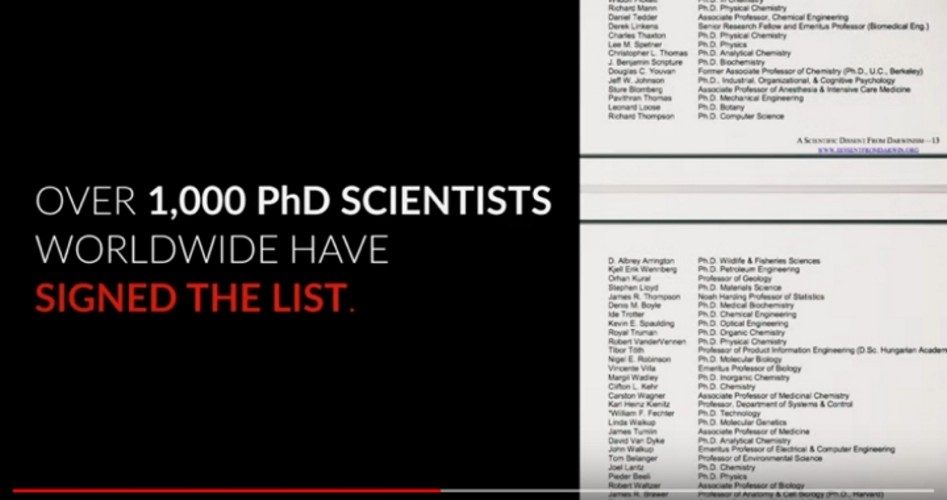
Over 1,000 doctoral scientists from around the world have signed a “Dissent” statement expressing skepticism about Darwin’s evolution theory, sparking fresh controversy over an idea that is at the core of many people’s worldview. The significant announcement, made last month, has been all but ignored by the establishment media. But it is making waves nevertheless.
The dissenting scientists all united around one simple statement. “We are skeptical of claims for the ability of random mutation and natural selection to account for the complexity of life,” the Ph.D.s said. “Careful examination of the evidence for Darwinian theory should be encouraged. There is scientific dissent from Darwinism. It deserves to be heard.”
The growing rebellion among scientists from a broad range of scientific disciplines suggests the science may not be as settled as evolution theorists claim, according to analysts. Despite enormous risks to their careers and reputations, the number of experts willing to speak out about their skepticism of Darwin’s theory is growing quickly.
And many of the scientists speaking out about this are prominent and highly respected. More than a dozen of the signatories, for instance, are members of various national academies of science, including those in the United States, Russia, Hungary, the Czech Republic, and other nations, as well as the Royal Society.
More than a few come from America’s most prestigious universities such as Harvard, MIT, Princeton, and Yale. Others come from prestigious foreign universities and research institutions such as the University of Cambridge, London’s Natural History Museum, Moscow State University, Hong Kong University, University of Stellenbosch in South Africa, Institut de Paléontologie Humaine in France, Ben-Gurion University in Israel, and more.
The experts speaking out also represent a broad array of scientific disciplines and fields. These include molecular biology, biochemistry, biology, entomology, computational quantum chemistry, microbiology, psychiatry, behavioral sciences, astrophysics, marine biology, cellular biology, physics, astronomy, math, geology, anthropology, and many more. Many medical doctors are raising questions, too.
“As a biochemist I became skeptical about Darwinism when I was confronted with the extreme intricacy of the genetic code and its many most intelligent strategies to code, decode, and protect its information,” explained Dr. Marcos Eberlin, founder of the Thomson Mass Spectrometry Laboratory and a member of the Brazilian National Academy of Sciences.
Among the prestigious scientists who have signed the statement are evolutionary biologist and textbook author Dr. Stanley Salthe; quantum chemist Henry Schaefer at the University of Georgia; U.S. National Academy of Sciences member Philip Skell; American Association for the Advancement of Science Fellow Lyle Jensen; Russian Academy of Natural Sciences embryologist Lev Beloussov; and geneticist Giuseppe Sermonti, editor emeritus of Rivista di Biologia / Biology Forum and discoverer of genetic recombination in antibiotic-producing Penicillium and Streptomyces.
The project, known as “A Scientific Dissent From Darwinism,” was first launched by the Discovery Institute in 2001. It was started in response to the demonstrably false claim by the tax-funded Public Broadcasting System (PBS) that “virtually every scientist in the world believes the theory to be true.” Obviously, that is not true. So Discovery Institute bought advertisements proving it in the New York Review of Books and other venues.
Since then, the number of public dissenters has grown tenfold. Indeed, many prominent scientists now dispute the evolution theory. A recent documentary that appeared on Netflix, Is Genesis History?, features myriad Ph.D. scientists outlining their arguments against evolution and in favor of biblical creation.
This writer attended a conference in Turkey recently that brought together respected scientists from all over the world and from all different religions who argued that the evolution theory was a “hoax.” These included prestigious American scientists who have worked for NASA and leading U.S. universities. It also included Catholics, Protestants, Muslims, Mormons, and more.
The Seattle-based Discovery Institute, which advocates for Intelligent Design, is still growing its list of well over 1,000 Ph.D. scientists who dissent from Neo-Darwinism and its central tenet — the notion that random mutations and natural selection can generate the massive amount of genetic information present in living organisms. Indeed, critics of the evolution theory say there has never been a documented example of a mutation adding genetic information rather than destroying it.
Neurosurgery Professor Dr. Michael Egnor at State University of New York, Stony Brook, argued that scientists “know intuitively that Darwinism can accomplish some things, but not others.” “The question is what is that boundary? Does the information content in living things exceed that boundary? Darwinists have never faced those questions,” he explained. “They’ve never asked scientifically, can random mutation and natural selection generate the information content in living things.”
And the institute believes that the 1,000 plus scientists who have signed the statement represent the tip of a massive iceberg. “While that number surely represents a scientific minority, it also no doubt vastly understates the number of Darwin-doubting PhD scientists,” wrote Discovery Institute Senior Fellow David Klinghoffer at Evolution News.
“When it comes to evolution, persecution is an all too well known fact of academic life. Endorsing Darwinian evolution is the safe careerist move, while questioning it can easily mean the end of your career,” added Klinghoffer. “So for every signer of the Dissent list, there is some multiplier’s worth of private skeptics in science, acting self-protectively. That is beyond reasonable doubt.”
Indeed, the growing willingness of leading scientists to speak out with their doubts about Darwin’s theory of evolution is especially noteworthy because it comes in the face of increased persecution of dissenters.
In 2017, for example, California State University at Northridge (CSUN) fired a Christian scientist after he published explosive evidence indirectly contradicting the theory in a peer-reviewed journal. Basically, Mark Armitage, a microscopist, found soft tissue in a dinosaur bone that was supposed to be around “65 million years old,” strongly indicating that the dinosaur in question died much more recently. The university paid him almost $400,000 in a settlement.
More than a few scientists have argued that peer pressure and fear are preventing an honest examination of the subject. “Because no scientist can show how Darwin’s mechanism can produce the complexity of life, every scientist should be skeptical,” said biologist Douglas Axe, director of the Biologic Institute. “The fact that most won’t admit to this exposes the unhealthy effect of peer pressure on scientific discourse.”
Meanwhile, as more and more scientists speak out, Americans largely continue to reject the evolution theory as well, and interest in the question is surging. Despite the theory being taught to generations of American children in government schools as if it were a fact, recent polls show about half of Americans still believe in a literal interpretation of the Bible’s Book of Genesis. In short, they believe that God created humans within fewer than 10,000 years. Only a minority — fewer than 15 percent — believe that godless evolution explains the origin of man, which is what is taught to children at government schools.
“Where there’s a genuine controversy, as there is about Darwinian theory, anyone in search of truth has no choice but to weigh the evidence for himself,” observed the Discovery Institute’s Klinghoffer. “The observation that, beyond doubt, thousands of scientists are skeptical, and that a thousand of them publicly call for further ‘careful examination’ of the question, is one reason every thoughtful adult owes it to herself to consider the evidence without just passively swallowing the majority view.”
Beyond the scientific aspects, there are also profound implications of the theory. One reason religious humanists such as public-education founding father John Dewey latched on to it so fervently is because it allowed them to exclude the existence of a Creator. America’s Founding Fathers held as a “self-evident” “truth” that man was created, and endowed by that Creator with certain rights. Humanists such as Dewey and his cohorts, who designed the modern public-school system, rejected that — along with the concept of unalienable, God-given rights that governments exist to protect.
Regardless of what one thinks about the evolution theory, it is still a theory. To force Americans who disagree with this controversial theory to fund its propagation in taxpayer-funded government schools — especially when no alternative is even allowed to be mentioned, and when the implications are so huge — is immoral and wrong. Parents and taxpayers should take a lesson from these courageous scientists and speak out.
Image: screenshot form YouTube video
Alex Newman is a contributor to The New American, covering economics, education, politics, and more. He can be reached at [email protected]. Follow him on Twitter @ALEXNEWMAN_JOU or on Facebook.
Related articles:
Science Debate on Evolution vs. Creation Draws Huge Audience
International Scientific Conference Deems Evolution A “Hoax”
Poll: More than Half of U.S. Rejects Evolution Theory
University Fires Scientist After Dinosaur Discovery Challenges Evolution
Creation Scientists Slam Evolution Propaganda in Schools
Intelligent Design and Evolution
U.K. Government Exalts Evolution, Outlaws Creationism
Teacher Fired for Critical View of Evolution
“The Mysterious Islands” Challenges Darwin
Demythologizing Darwin—A Review of Wiker’s “The Darwin Myth”
Texas School Board Debates Adding Books With Alternatives to Evolution


